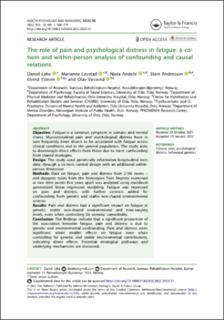| dc.contributor.author | Løke, Daniel | |
| dc.contributor.author | Løvstad, Marianne | |
| dc.contributor.author | Andelic, Nada | |
| dc.contributor.author | Andersson, Stein | |
| dc.contributor.author | Ystrøm, Eivind | |
| dc.contributor.author | Vassend, Olav Mandt | |
| dc.date.accessioned | 2022-07-29T06:17:50Z | |
| dc.date.available | 2022-07-29T06:17:50Z | |
| dc.date.created | 2022-03-01T15:58:39Z | |
| dc.date.issued | 2022 | |
| dc.identifier.citation | Health Psychology and Behavioral Medicine. 2022, 10 (1), 160-179. | |
| dc.identifier.issn | 2164-2850 | |
| dc.identifier.uri | https://hdl.handle.net/11250/3009076 | |
| dc.description.abstract | Objective: Fatigue is a common symptom in somatic and mental illness. Musculoskeletal pain and psychological distress have in turn frequently been shown to be associated with fatigue across clinical conditions and in the general population. The study aims to disentangle direct effects from those due to mere confounding from shared etiologies. Design: The study used genetically informative longitudinal twin data, through a co-twin control design with an additional within-person dimension. Methods: Data on fatigue, pain and distress from 2196 mono – and dizygotic twins from the Norwegian Twin Registry examined at two time points five years apart was analyzed using multilevel generalized linear regression modeling. Fatigue was regressed on pain and distress, with further controls added for confounding from genetic and stable non-shared environmental sources. Results: Pain and distress had a significant impact on fatigue at genetic, stable non-shared environmental and time-varying levels, even when controlling for somatic comorbidity. Conclusion: The findings indicate that a significant proportion of the association between fatigue, pain and distress is due to genetic and environmental confounding. Pain and distress exert significant, albeit smaller effects on fatigue even when controlling for genetic and stable environmental contributions, indicating direct effects. Potential etiological pathways and underlying mechanisms are discussed. | |
| dc.description.abstract | The role of pain and psychological distress in fatigue: a co-twin and within-person analysis of confounding and causal relations | |
| dc.language.iso | eng | |
| dc.title | The role of pain and psychological distress in fatigue: a co-twin and within-person analysis of confounding and causal relations | |
| dc.title.alternative | The role of pain and psychological distress in fatigue: a co-twin and within-person analysis of confounding and causal relations | |
| dc.type | Peer reviewed | |
| dc.type | Journal article | |
| dc.description.version | publishedVersion | |
| dc.source.pagenumber | 160-179 | |
| dc.source.volume | 10 | |
| dc.source.journal | Health Psychology and Behavioral Medicine | |
| dc.source.issue | 1 | |
| dc.identifier.doi | 10.1080/21642850.2022.2033121 | |
| dc.identifier.cristin | 2006775 | |
| dc.relation.project | Norges forskningsråd: 288083 | |
| cristin.ispublished | true | |
| cristin.fulltext | original | |
| cristin.qualitycode | 1 | |
